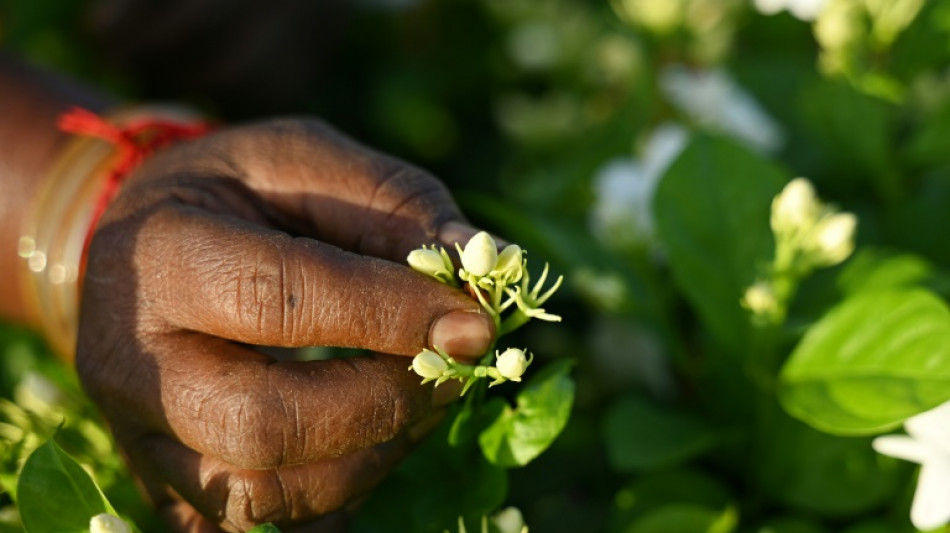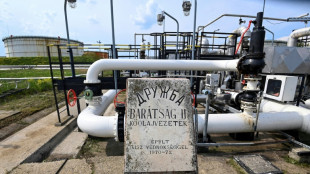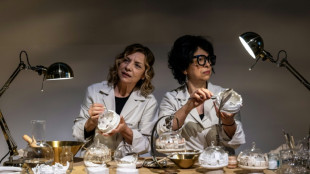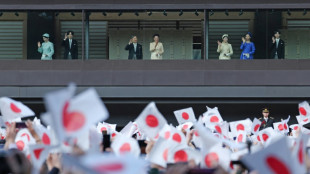
-
 Spurs struggling physically admits Tudor
Spurs struggling physically admits Tudor
-
Lens held by Strasbourg in blow to Ligue 1 title chances

-
 NFL salary cap passes $300 mn for first time
NFL salary cap passes $300 mn for first time
-
Wolves secure rare win to dent Villa's bid for Champions League place

-
 Oil prices jump on Iran attack fears while US stocks fall
Oil prices jump on Iran attack fears while US stocks fall
-
Two dead, dozens injured as tram derails in Milan

-
 Trump tells US govt to 'immediately' stop using Anthropic AI tech
Trump tells US govt to 'immediately' stop using Anthropic AI tech
-
Court orders Greenpeace to pay $345 mn to US oil pipeline company

-
 IAEA stresses 'urgency' to verify Iran's nuclear material
IAEA stresses 'urgency' to verify Iran's nuclear material
-
UN urges action to prevent full civil war in South Sudan

-
 Hackers steal medical details of 15 million in France
Hackers steal medical details of 15 million in France
-
Susan Sarandon praises Spain’s stance on Gaza

-
 Murray adamant size isn't everything despite losing Wales place
Murray adamant size isn't everything despite losing Wales place
-
Messi knocked down by fan in Puerto Rico pitch invasion

-
 Two killed, dozens injured as tram derails in Milan
Two killed, dozens injured as tram derails in Milan
-
O'Neill taken aback by Rangers boss Rohl's comments on Celtic

-
 Ukrainian, Slovak leaders hold call amid energy spat
Ukrainian, Slovak leaders hold call amid energy spat
-
French hard-left firebrand sparks row with 'antisemitic' Epstein jibe

-
 Ahmed, Jacks blast England to thrilling win over New Zealand
Ahmed, Jacks blast England to thrilling win over New Zealand
-
UK police arrest man after Churchill statue sprayed with graffiti

-
 Bill Clinton denies wrongdoing at grilling on Epstein ties
Bill Clinton denies wrongdoing at grilling on Epstein ties
-
Red Cross urges Afghanistan-Pakistan 'de-escalation'

-
 Coup role revelations revive calls for return of Spain's ex king
Coup role revelations revive calls for return of Spain's ex king
-
Oil prices jump on Iran attack fears, Wall Street slips on AI

-
 TikTok disinformation: the other weapon in Mexico violence
TikTok disinformation: the other weapon in Mexico violence
-
Carmaker BMW to trial humanoid robots at German factory

-
 NASA announces overhaul of Artemis lunar program amid technical delays
NASA announces overhaul of Artemis lunar program amid technical delays
-
Golfer Pavan undergoes surgery after freak lift fall

-
 Bill Clinton faces grilling on extensive ties to Epstein
Bill Clinton faces grilling on extensive ties to Epstein
-
For Roberto Cavalli designer, dreams come in all black

-
 Macron to set out how France's nuclear arms could protect Europe
Macron to set out how France's nuclear arms could protect Europe
-
Spin-heavy England restrict New Zealand to 159-7 in Super Eights

-
 Starmer vows to fight 'extremes' after UK Labour election drubbing
Starmer vows to fight 'extremes' after UK Labour election drubbing
-
New Pokemon titles on horizon as 30th anniversary approaches

-
 Arteta backs Gyokeres to impact Arsenal's trophy charge
Arteta backs Gyokeres to impact Arsenal's trophy charge
-
55 Ghanaians killed after being lured into Ukraine war: govt

-
 OpenAI raises $110 bn in record funding round
OpenAI raises $110 bn in record funding round
-
Medvedev swats Auger-Aliassime aside to reach Dubai final

-
 Stocks slide, oil jumps tracking AI and Iran
Stocks slide, oil jumps tracking AI and Iran
-
France warns of 'provocation' if Russian drone buzzed aircraft carrier

-
 At Milan Fashion Week, industry's darker side goes unmentioned
At Milan Fashion Week, industry's darker side goes unmentioned
-
'Impressive' Maguire has Man Utd future says Carrick

-
 'Games you live for': Rosenior relishes Chelsea's PSG tie
'Games you live for': Rosenior relishes Chelsea's PSG tie
-
'Sacrificed futures': German chemical workers protest looming job cuts

-
 Scientists discover giant bird-like dinosaur in Niger desert
Scientists discover giant bird-like dinosaur in Niger desert
-
Pakistan promise final flourish as they await T20 World Cup fate

-
 Kurdish Iranian groups in Iraq eye opportunity for change at home
Kurdish Iranian groups in Iraq eye opportunity for change at home
-
Suter wins as Aicher closes gap on absent Vonn in downhill title race

-
 Man City have learnt lessons from Real Madrid clashes: Guardiola
Man City have learnt lessons from Real Madrid clashes: Guardiola
-
Isolated Kremlin critics lament lost future at Nemtsov memorial


Scent of luxury: India's jasmine infuses global perfume
Heady scents fill the air as skilled pickers in India pluck white jasmine before the still fresh buds are rushed for processing into a valuable ingredient for global perfumes.
Jasmine only issues its powerful scent when it blooms at night, and pickers must select only the ones yet to open.
"We know which one to pick," said Malarkodi, who gave only one name, as she snapped her fingers carefully to pluck the buds, tucking into her hair a few flowers that had already bloomed.
"There is no use of these... but I like the smell," she said.
Jasmine's fragrant flowers have been used for millennia in India to honour the gods, and the scent is a key part of world-famous perfumes.
In the ancient city of Madurai in southern India, jasmine is omnipresent -- attracting buyers from some of the world's most recognisable perfumes, including J'adore by Dior and Mon Guerlain by Guerlain.
"It is one of the most expensive oils in the world," said Raja Palaniswamy, a director of Jasmine Concrete, which squeezes vast quantities of jasmine to create a few precious drops of delicious-smelling essence.
The women picking the buds earn around $1.50 a day per day for about four to five kilograms -- with each kilogram made up of around 4,000 buds.
Once picked, the jasmine is rushed to market, selling for anything between 200 and 2,000 rupees ($2.40-$24) a kilogram on special days.
- 'Expression of love' -
The jasmine of Madurai, an Asian variety with the scientific name Jasminum sambac, was given a "geographical indication" tag from the World Intellectual Property Organization in 2013, which noted its "deep fragrance".
"It is lush, it is rich, it is vibrant," said Thierry Wasser, perfumer and "nose" at French beauty house Guerlain, speaking to AFP while visiting the jasmine operators.
The jasmine in Madurai has a "smoothness... and something floral which is immutable," Wasser added. Wasser sources the jasmine oil he uses from Palaniswamy's company.
As well as Guerlain, Palaniswamy said his company sells jasmine oil to companies including Bulgari, Dior and Lush.
In Madurai, the bright, white flower can be found in the homes of the city's residents, as strings fastened by women to their hair -- and in the sprawling 14th-century complex of the Hindu goddess Meenakshi, considered the guardian of the city.
Meenakshi is depicted holding a parrot, a bird associated with love.
Every night, people surround a shrine of the goddess with fragrant jasmine flowers as she retires with her husband Shiva in a grand, symbolic ceremony.
"When you understand that the purpose of this flower is the celebration of love and brotherhood and family and friendship; when you smell it, it takes another dimension," Wasser said.
"And to me this flower is the expression of love. Period."
-'Real fragrance' -
The process to extract the oil requires long hours of labour.
The women who pluck the jasmine -- be it for their deity, weddings, funerals or expensive perfumes -– have no time to romance its appeal.
In a jasmine field on the outskirts of the ancient city, women tenderly move the branches of the bush, looking for the perfect bud.
The processing factory runs around the clock in harvest season, with workers raking out fresh-picked flowers and waiting for the oblong-shaped buds to bloom.
"The minute it starts blooming, it starts emitting its fragrance," Palaniswamy said.
Late in the night, as the jasmine's sweet scent fills the air, workers collect the blooms and load them into extractors.
The freshly picked jasmine is immersed in a solvent to absorb the fragrance molecules to give a waxy extract called concrete.
The concrete is further processed with alcohol to remove the waxes carefully, which then results in a potent absolute. This absolute becomes the ingredient in perfumes.
Around 700 kilograms of fresh jasmine is reduced to just one kilogram of oil, selling for around $4,200, Palaniswamy said.
But Amsavalli Karuppuswamy, who runs a stall outside the flower market where she threads flowers into garlands, said the fresh jasmine will always outweigh any oil.
"I will continue to do this job till I die... women like jasmine, so that is why we are doing this," she said.
"The scents are not worth as much as the original jasmine flowers -- nothing can match the real fragrance of the jasmine."
F.Schneider--AMWN



